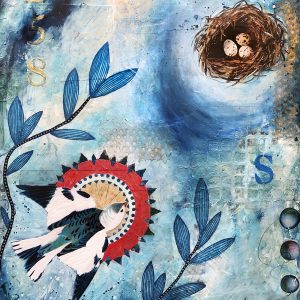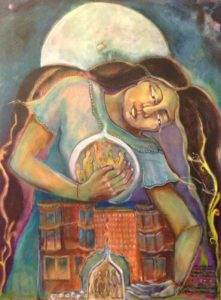 The Columbia City Yoga on-line Moving into Meditation classes met this morning. Today we explored wholeness by listening to the inner voices that are difficult to hear. These voices want to be heard. They often express painful emotions and reflect underlying beliefs that cause us suffering. We created a “ministry of presence” capable of listening. The ministry is made up of healing councils such as: “a council of forgiveness, compassion and openness.” We then cultivated loving presence and engaged our inner council to feel, listen and care.
The Columbia City Yoga on-line Moving into Meditation classes met this morning. Today we explored wholeness by listening to the inner voices that are difficult to hear. These voices want to be heard. They often express painful emotions and reflect underlying beliefs that cause us suffering. We created a “ministry of presence” capable of listening. The ministry is made up of healing councils such as: “a council of forgiveness, compassion and openness.” We then cultivated loving presence and engaged our inner council to feel, listen and care.
We drew inspiration from mediation teacher and author Sharon Salzberg’s new book, Real Life: The Journey from Isolation to Openness and Freedom. In Real Live, Sharon describes how we can engage a ministry of presence and form inner councils of support. It is part of her intention to help reader’s live more expansively from the truth of their being. Mindfulness, presence can help us to lead authentic lives. We can extend our ability to accept and care for others to the degree we can do this for ourselves.
Today I would like to explore the wholeness we experience when we can embrace those parts of ourselves that live in the shadow or perhaps as a shadow. There are voices that emerge when we’re having difficulty, when we’re afraid, when we’re suffering. When we’re going through something hard that is difficult to accept. My dear friend and I meet every week for tea and we have these conversations that we call our “It’s Hard to be Human” talks. My friend is authentic, caring, compassionate and loving. During our talks she welcomes her shadow and mine. While it’s hard to be human my friend reminds me that it’s wondrous too.
In her new book, Real Life: The Journey from Isolation to Openness and Freedom, Sharon Salzberg asks:
What would it be like to have a mind not so easily overwhelmed by harmful thoughts? A mind that does not disparage us in terms of our actions, speech, thoughts, desires or fears – and does not deride others for these things either. A mind that is aware of the joy of committing to not causing harm, yet realizes that love and compassion are better catalysts for change than shame or fear.
And of course Sharon’s book is about answering this question. It’s about the healing that can happen when we’re able to be with difficult feelings. She writes:
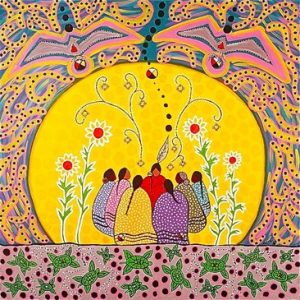 Many healing modalities such as mindfulness meditation, are designed to help us cultivate a ministry of presence for ourselves – a council of forgiveness, compassion and openness in the face of our own inner pain – so that ultimately we are also relating differently to the pain of others. We effect change by profoundly transforming the environment the pain is held within.
Many healing modalities such as mindfulness meditation, are designed to help us cultivate a ministry of presence for ourselves – a council of forgiveness, compassion and openness in the face of our own inner pain – so that ultimately we are also relating differently to the pain of others. We effect change by profoundly transforming the environment the pain is held within.
Let’s just pause for a moment. Let’s get centered. Take a few deeper breaths and let them go slowly. Feel your body. You might be aware of the points of contact with the Earth or your hands resting in your lap. Sense yourself being here. I invite you to reflect on what you would include in your ministry of presence. What council do you need at this time in your life? Notice what surfaces for you. Let this query be like a seed you plant in your heart. Something to think about or revisit when a difficulty arises. You might silently name the resources you would draw on: forgiveness, compassion, openness, patience, a companion’s support.
 Now bring to mind a difficult situation in your life. One that brings feeling such as anger, fear, shame or hurt. Choose something that has a moderate charge, not something traumatic. It may be a conflict with a family member, a habit you’d like to change, a conversation you now regret, a mistake you made, something that triggers feelings of discomfort and hurt or remorse.
Now bring to mind a difficult situation in your life. One that brings feeling such as anger, fear, shame or hurt. Choose something that has a moderate charge, not something traumatic. It may be a conflict with a family member, a habit you’d like to change, a conversation you now regret, a mistake you made, something that triggers feelings of discomfort and hurt or remorse.
As you bring the situation to mind, take some moments to enter the experience so that you’re visualizing the situation. Remember the words that were spoken. Sense the most distressing moments. Begin to recognize what is happening. Ask yourself “What’s happening inside me right now?” Take a moment to become aware of your felt sense of the situation as a whole. Contact whatever emotions are predominant.
Allow the situation to be just as it is. Find the willingness right now to pause and accept that in these moments, it’s like this. Intend to let it be, to let your experience be just as it is.
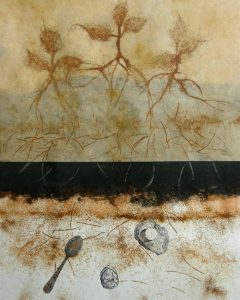 Investigate what’s going on inside you. Bring a caring attitude of curiosity, You might ask questions: “What most wants attention? What most wants acceptance? What’s the worst part of this? You might ask yourself “What am I believing?” Maybe there’s a distinct belief that you’re unacceptable in some way, or that you’re failing, or that someone will judge you or reject you. You might lose the esteem of others. Investigate the belief. How does that feel in your body? Come right into your body and feel the experience. What’s the emotion that comes up? Is it fear, anger, grief, shame?
Investigate what’s going on inside you. Bring a caring attitude of curiosity, You might ask questions: “What most wants attention? What most wants acceptance? What’s the worst part of this? You might ask yourself “What am I believing?” Maybe there’s a distinct belief that you’re unacceptable in some way, or that you’re failing, or that someone will judge you or reject you. You might lose the esteem of others. Investigate the belief. How does that feel in your body? Come right into your body and feel the experience. What’s the emotion that comes up? Is it fear, anger, grief, shame?
Continue to bring attention to your body, feel the sensations that are there. Perhaps there’s heat, twisting, tightness, soreness. Allow yourself to investigate by going inside the place the feels most hurt or vulnerable. You might ask this place of hurt or vulnerability: What do you most need? How do you want me to be with you? Does the suffering part of you want acceptance? Forgiveness? Love?
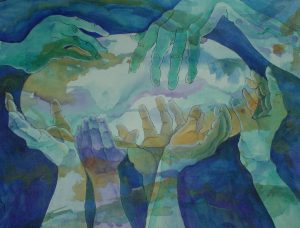 As you sense what is needed, you might bring in that kindness by offering yourself a wise message, perhaps the phrase “I’m sorry, and I love you.” or “I forgive you.” You might experiment tenderly placing your hand on your heart. Sense that you are befriending yourself. Allow these nurturing moments to have a real sense of intimacy and kindness.
As you sense what is needed, you might bring in that kindness by offering yourself a wise message, perhaps the phrase “I’m sorry, and I love you.” or “I forgive you.” You might experiment tenderly placing your hand on your heart. Sense that you are befriending yourself. Allow these nurturing moments to have a real sense of intimacy and kindness.
As you receive this kind presence, you might simply rest in presence. If you can, be with the freedom of not being identified with emotional pain. Be with the freedom of not being identified with these difficult emotions. You’re resting in your natural, compassionate awareness. Relax, rest in the sense of openheartedness and presence. Know this natural awareness as the innermost truth of what you are.
I’ll close with Sharon’s words of encouragement:
With more fully opening to the truth of what is painful . . . we can learn to breathe more freely, to connect to one another, to live, and to love, 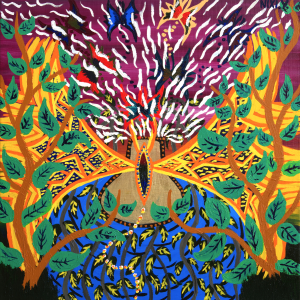 even in difficult circumstances. We develop a ministry of presence for ourselves and for the world – a council of connection, tenderness, and caring in the face of both great happiness and inescapable sorrow. And when we falter, we can forgive ourselves and begin again. This vision of possibility is realized step by step. . . . This kind of vision need not be held as an over idealized image of how we should be, and certainly not as an over idealized image we use as a cudgel to punish ourselves. Sometimes the truth is that the most we can do is ride out a painful situation and try to remember that the truth is that we’re not alone.
even in difficult circumstances. We develop a ministry of presence for ourselves and for the world – a council of connection, tenderness, and caring in the face of both great happiness and inescapable sorrow. And when we falter, we can forgive ourselves and begin again. This vision of possibility is realized step by step. . . . This kind of vision need not be held as an over idealized image of how we should be, and certainly not as an over idealized image we use as a cudgel to punish ourselves. Sometimes the truth is that the most we can do is ride out a painful situation and try to remember that the truth is that we’re not alone.

